Trump hosts El Salvador’s Bukele amid legal row over deportee
Deportee Kilmar Abrego’s mistaken removal has become a legal flashpoint in the new alliance.
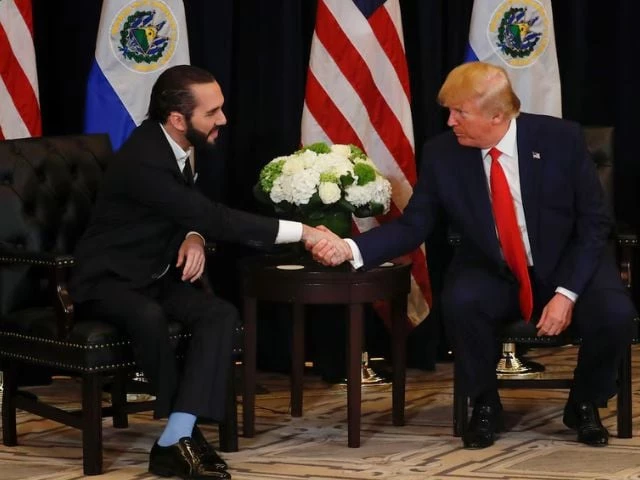
US President Donald Trump hosted El Salvador’s President Nayib Bukele at the White House on Monday, reinforcing a growing alliance between the two leaders centred on a shared hardline approach to immigration and crime.
The visit follows a controversial agreement under which El Salvador has accepted over 250 deportees from the United States, many of whom were placed in the country’s high-security CECOT mega-prison, a centrepiece of Bukele’s anti-gang strategy.
The White House said the meeting focused on “joint efforts to dismantle transnational criminal organisations,” as both governments continue to defend the legality and effectiveness of their security cooperation.
Bukele, widely seen as the Trump administration’s closest ally in Latin America, has received both praise and criticism for his authoritarian style and mass incarceration policies. His government recently received $6 million in exchange for accepting US deportees, which he described as “a very high sum for El Salvador.”
The partnership has drawn scrutiny, particularly in the case of Kilmar Abrego Garcia, a Maryland resident mistakenly deported to El Salvador in what US officials admitted was an “administrative error.”
Last week, the US Supreme Court unanimously ordered the Trump administration to facilitate Garcia’s return, but federal officials have maintained that he now falls under Salvadoran jurisdiction.
In a court filing, a State Department official confirmed Garcia is “alive and secure” but “detained pursuant to the sovereign domestic authority of El Salvador.”
US lawmakers have expressed concern over the case. The Congressional Hispanic Caucus called Garcia’s detention “neither legal nor ethical,” and Representative Adriano Espaillat has requested a consular visit.
Despite the legal dispute, White House spokeswoman Karoline Leavitt said the prison partnership remained a core part of Monday’s talks.
Bukele’s visit comes amid El Salvador’s attempt to secure relief from recently imposed US tariffs, which apply a 10 percent duty on key Salvadoran exports including textiles, sugar and coffee.
The United States is El Salvador’s largest trade partner, accounting for $2.1 billion of the country’s $6.5 billion in exports last year, according to the central bank.
Salvadoran industry leaders, including Jorge Arriaza of the Salvadoran Industrial Association, hope the Oval Office meeting will clarify the tariff's implementation and possible exemptions.
Remittances from Salvadorans living in the US remain vital to the Salvadoran economy, contributing $8.5 billion in 2024, or around 23 percent of GDP. With over 2.5 million Salvadorans in the US, concerns persist over how they may be impacted by Trump’s evolving immigration policies.
While the Trump administration has removed Temporary Protected Status (TPS) for several Latin American countries, it has retained it for El Salvador. Nonetheless, experts suggest Bukele may seek assurances for Salvadoran nationals during this visit.
For both leaders, the high-profile meeting serves mutual political interests. Bukele gains international legitimacy and a powerful ally in Washington, while Trump showcases a foreign leader willing to cooperate on migration enforcement and regional security.
“For Bukele, this is validation,” said Edwin Segura, a political analyst in San Salvador. “For Trump, it highlights the kind of partner he wants — someone who supports his agenda and delivers results.”
Bukele, who recently touted El Salvador’s upgrade to Level 1 in the US State Department’s travel advisory system, arrived in Washington with a promotional video and ceremonial fanfare. The event underlines his strategic repositioning of El Salvador as a safe, investible nation despite past criticism of his democratic record.
Ned Price, a former US State Department spokesperson, warned the optics of the meeting could embolden authoritarian-leaning leaders worldwide.
“It sends a signal that transactional diplomacy outweighs democratic values,” he said. “That’s a precedent with global implications.”






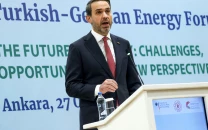
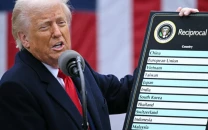


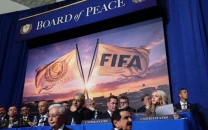
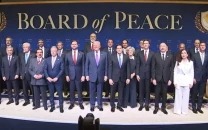












COMMENTS
Comments are moderated and generally will be posted if they are on-topic and not abusive.
For more information, please see our Comments FAQ